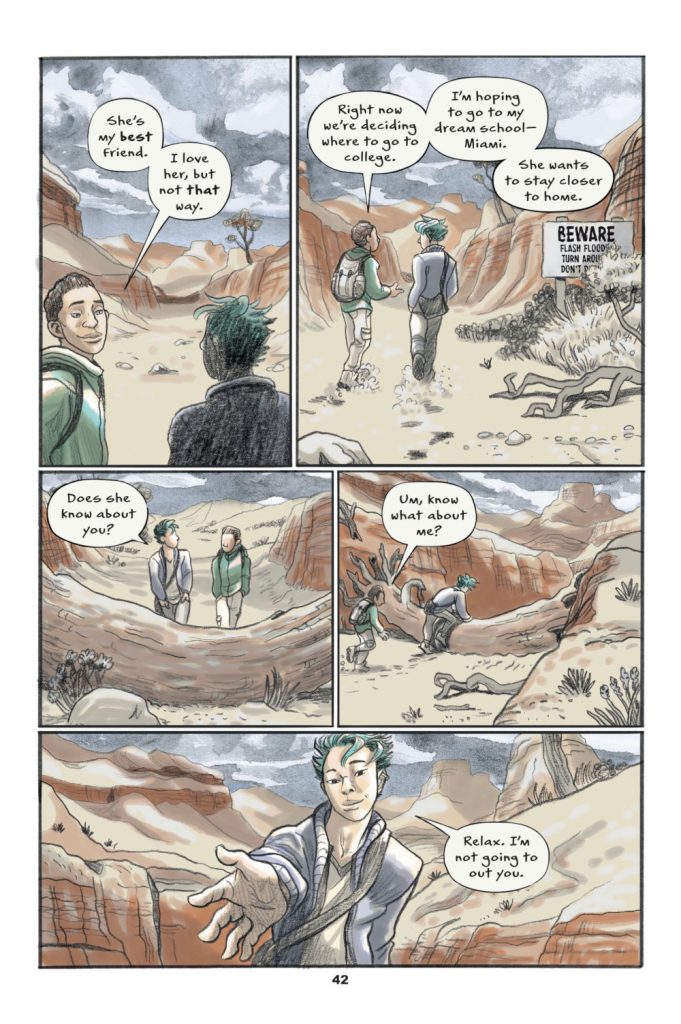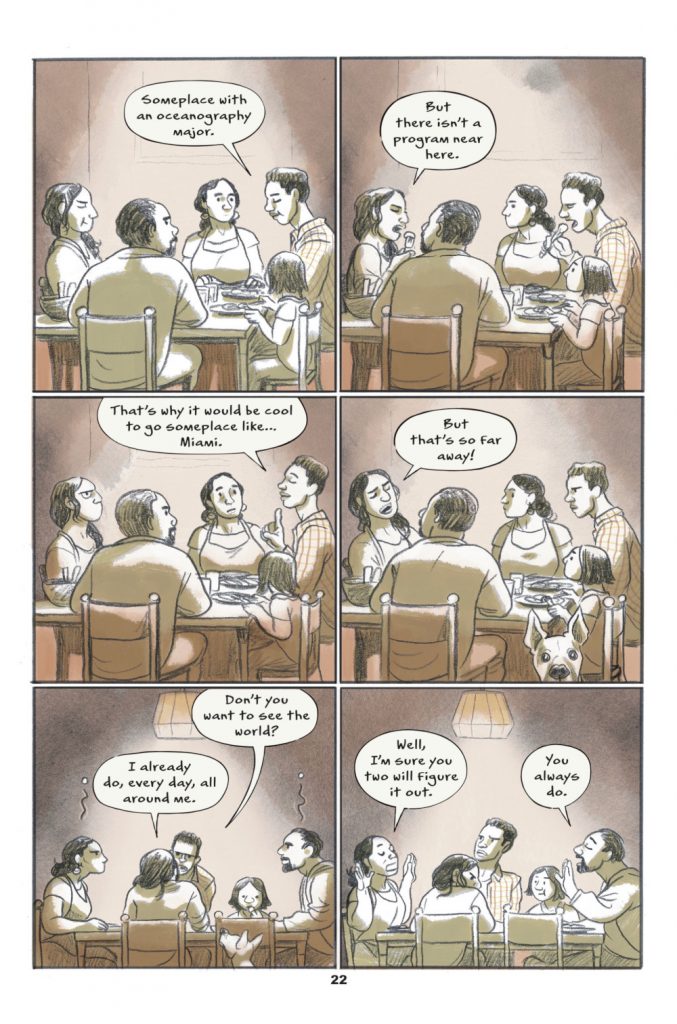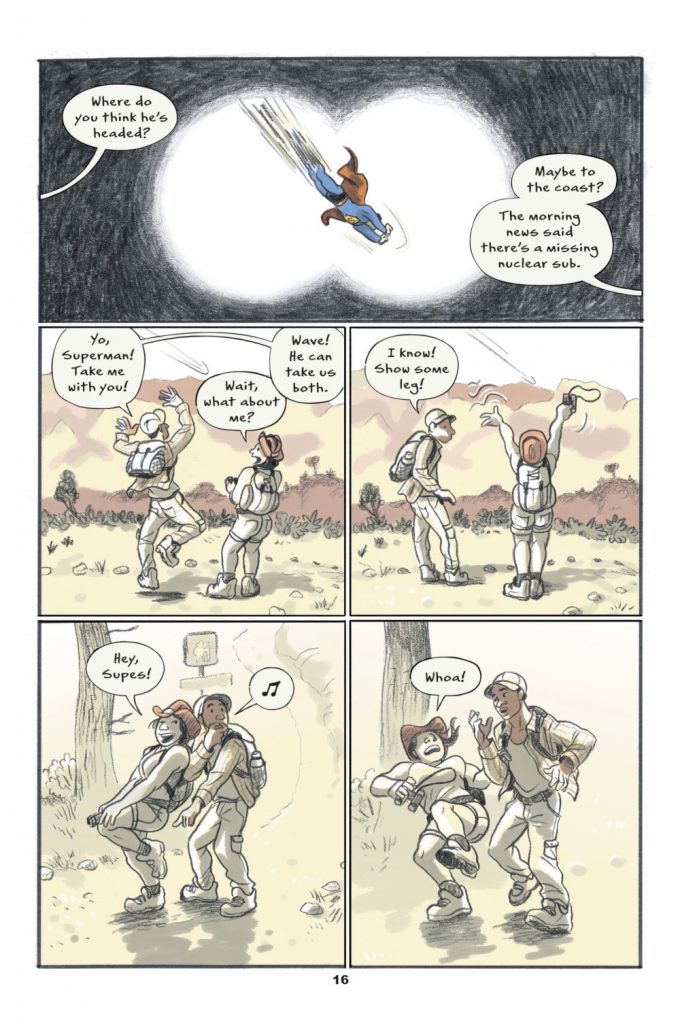You Brought Me The Ocean showcases how YA unleashes DC’s full potential
It’s hard to genuinely care about superheroes. I enjoy superhero media for its entertainment value, but often struggle when it comes to creating a deeper emotional connection with the characters, typically because stories emphasize the spectacular elements of the genre and lose sight of the personal ones. After reading superhero comics for 20 years, I’ve grown accustomed to the cycle of bold new directions circling back to the status quo, so any big changes come with a clock counting down when we go back to normal. I want to see characters and their worlds evolve over time and believe that the growth is going to stick, but I don’t know if that will ever happen when characters are in a central shared universe that is driven by editorial demands rather than individual creative vision.
A solution: break out of the central shared universe. Release the shackles of continuity and let creators tell their own stories. DC’s graphic novels for middle grade and young adult readers have blown me away for this exact reason, providing distinct takes that revitalize established IP for a new generation. These books feature diverse representation on and off the page, bringing in a wider variety of narrative and artistic perspectives while giving readers of all kinds characters they can see themselves in. 2020 has been especially rewarding, with books like Green Lantern: Legacy, Shadow Of The Batgirl, and Lois Lane And The Friendship Challenge tackling existing properties from fresh angles while Anti/Hero and My Video Game Ate My Homework expand DC with original concepts.
-

A page from You Brought Me the Ocean, art by Julie Maroh -

A page from You Brought Me the Ocean, art by Julie Maroh -

A page from You Brought Me the Ocean, art by Julie Maroh
You Brought Me The Ocean (YBMTO) is the type of story we’d never see in a main DCU monthly ongoing series, and if we did, it would probably be canceled before it reached this graphic novel’s page count. Written by Alex Sanchez, a Lambda Award-winning novelist, with art by Julie Maroh, creator of the seminal LGBTQ graphic novel Blue Is The Warmest Color (adapted into a Palme D’Or-winning film in 2013), YBMTO is the coming-out story of Jake Hyde, a high school senior aching to get out of the desert town of Truth Or Consequences, New Mexico, a real city that changed its name for a TV radio show contest. Jake has always felt pulled toward the ocean, which is why he secretly applied to study oceanography at the University of Miami, ignoring the wishes of his overprotective mother and a female best friend who wants him to stay in-state.
Reading YBMTO put me right back in the shoes of my closeted teenage self, and even though Jake and I have completely different backgrounds, his story feels like a reflection of my own. I firmly believe in the universality of specificity, and the more a writer is able to hone in a character’s unique experience, the more it will resonate with a wider range of people. Jake has superpowers and a supervillain father, but his desire to get out of his small town and struggle to understand his identity are hallmarks of being a teenager. I connected with the core themes of superhero comics because they spoke so much to my closeted adolescence, a time when I felt alienated from others because there was a side of myself I had to hide. Superheroes provide an ideal outlet to explore queerness, which is why it’s so frustrating that the genre stays largely rooted in heteronormativity.
I feel like my life would have turned out very different if I had a book like YBMTO as a teenager. In the early ’00s, it was hard to find affirming queer stories specifically made for younger readers, so there was little to counter the overwhelming pressure to act straight. I didn’t fight back when someone called me a faggot, I shrunk into myself and changed my behavior in the hopes that I could stop it from happening again. I generally view high school as a positive experience because I had a really great group of friends, but I forget about how tough freshman year was and how that hardened me in a way that made the next few years endurable.
A few years ago, a group of friends and I went through our high school yearbooks, and to my great embarrassment, my freshman yearbook was full of blacked-out names, most of them straight men who bullied me. One guy was such a shit that I blacked-out his name and his picture, like I was trying to erase him from my memory. And I hadn’t thought of him until I saw that black rectangle on the page and knew exactly who it was. I have a lot of good memories of my decade in the closet, but ultimately everything is soured by the fact that I wasn’t myself during that time. How would my life have changed if I had media that told me I was normal and good and deserved happiness?
A lot of Jake Hyde’s teenage experience echoes my own: the crush on a cute swimmer, the female best friend who wants to be a girlfriend, the fear of being othered by his sexuality. And I’m sure I’m not the only one. Gay boys are attracted to swimmers because they’re fit and barely wearing any clothes. Female best friends want to be girlfriends because they’ve found boys who care about them as something more than a sexual object. The fear of being othered is one of the greatest obstacles to coming out, and gay men will experience homophobia at some point in their lives, whether it’s directly from another person or institution or from media that devalues and caricatures homosexuality. YBMTO gives young queer readers, and more specifically, young queer readers of color, a hero they can relate to and connect with on a deep emotional level because the story gives him the complexity he deserves.
subscribers only.
Learn more about what you get with a subscription
